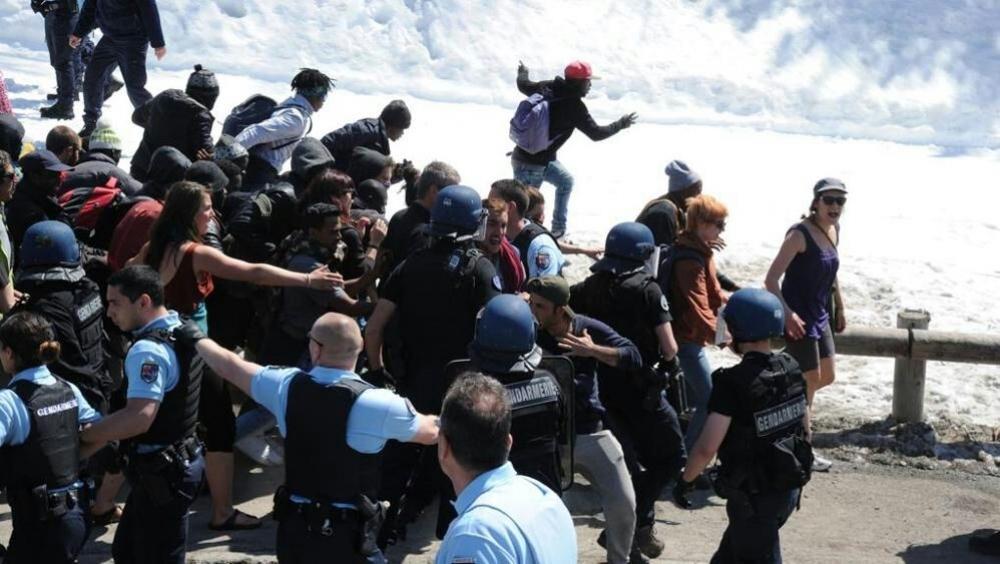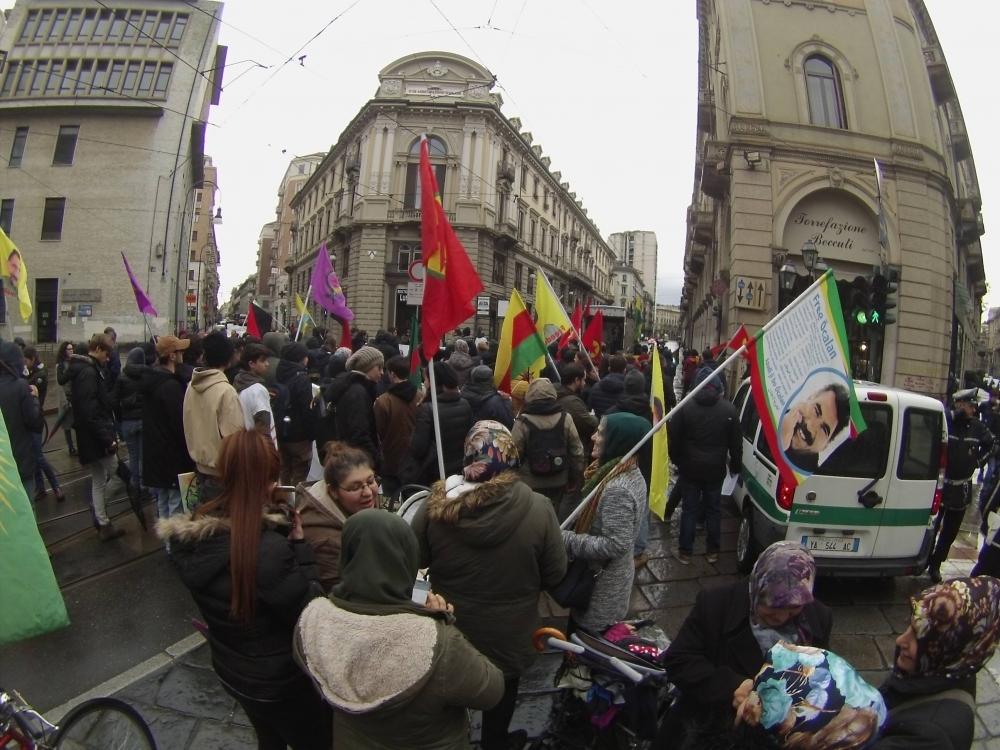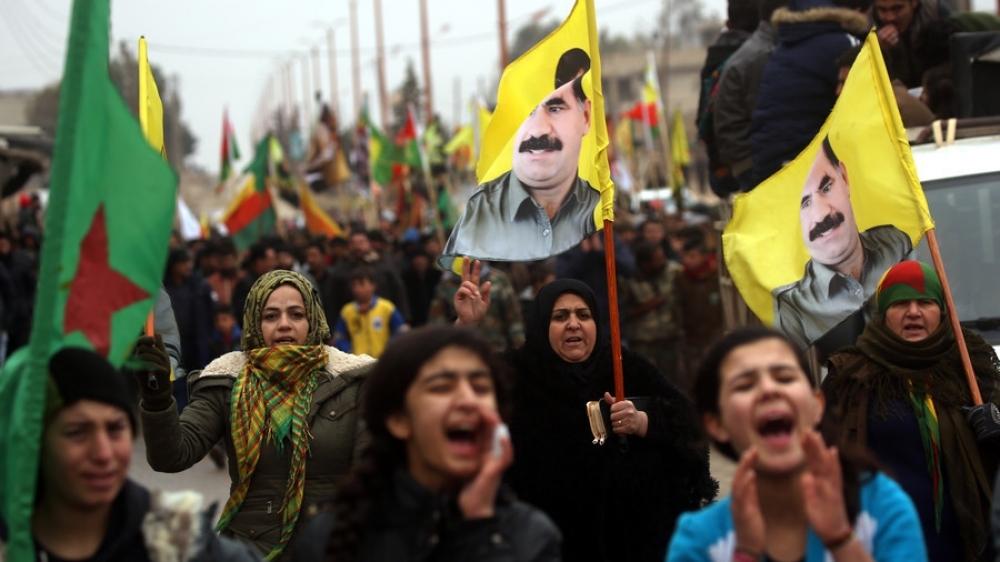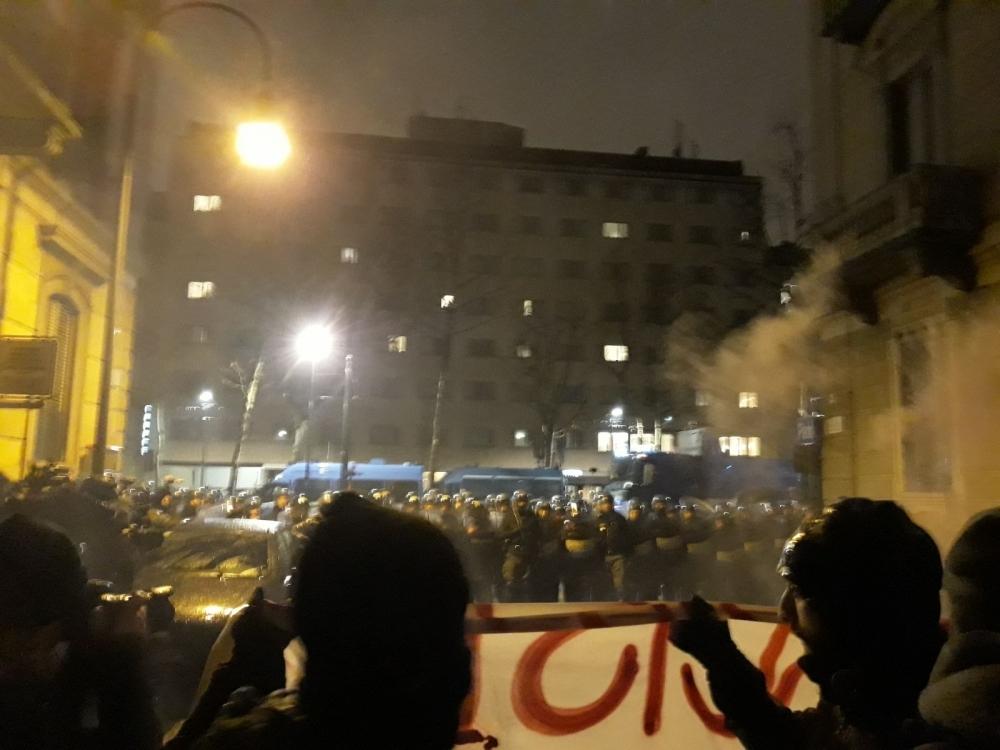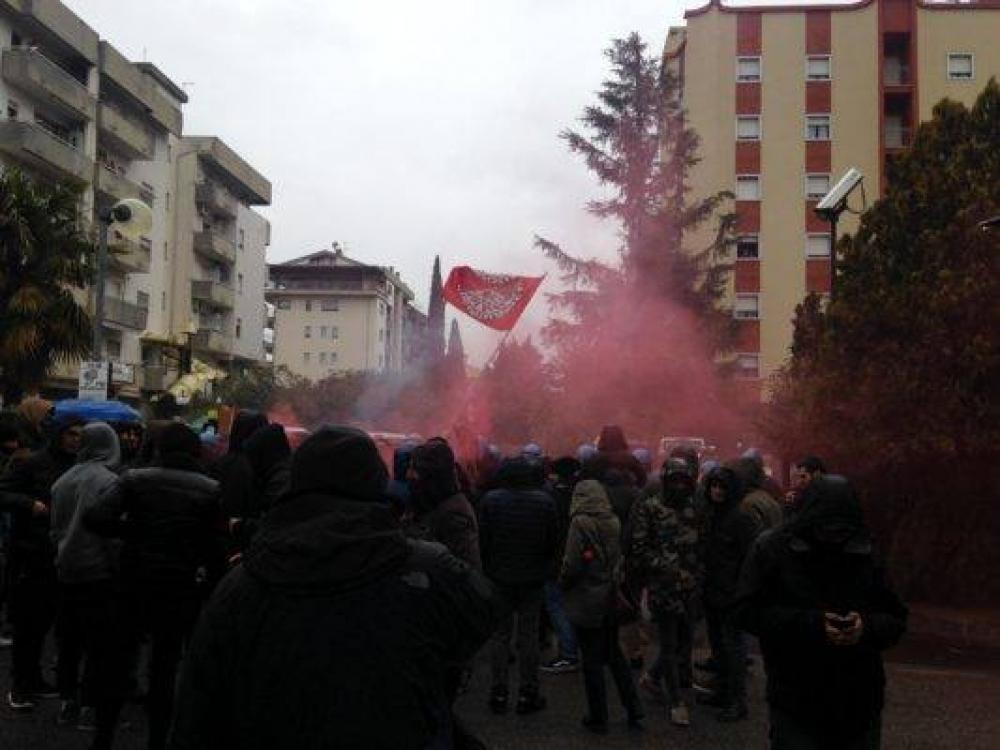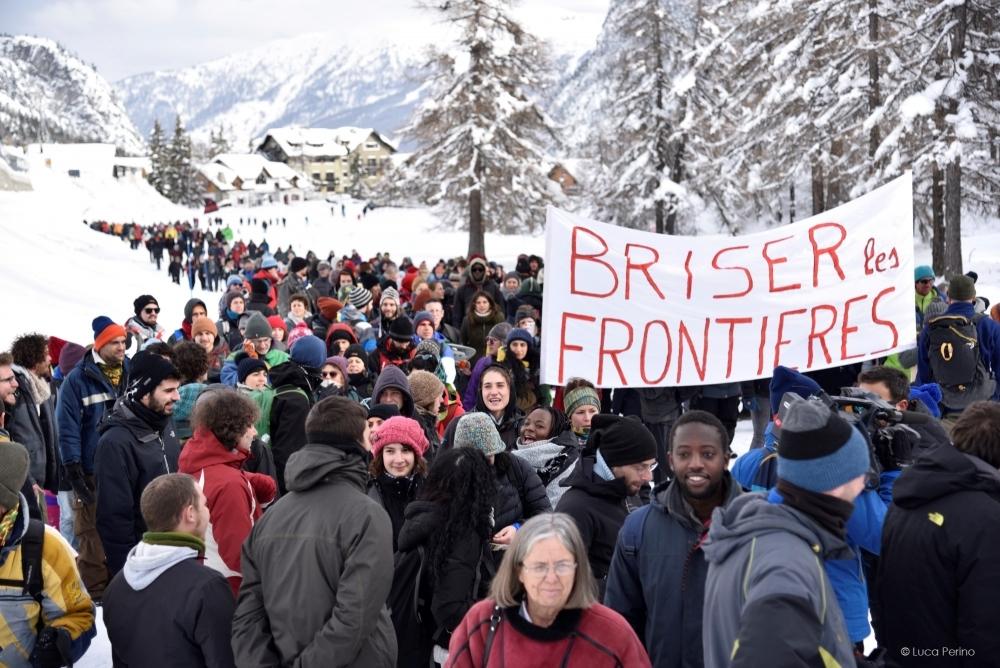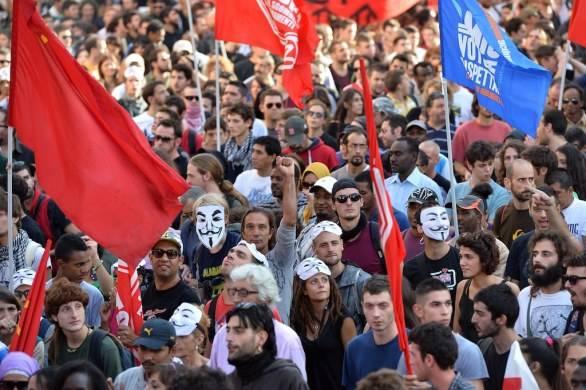
‘Only One Big Project’: Italy’s burgeoning social movements
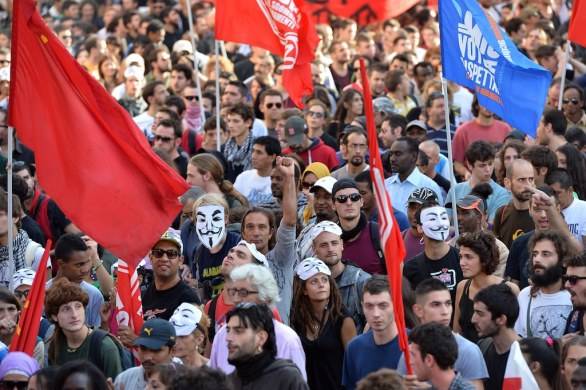
If there is one day that can symbolically represent the current struggle against austerity and neoliberalism in Italy it must be the 19th of October 2013 — the day of the General Uprising (“sollevazione generale”) against austerity. On that date, behind a banner that read “Only One Big Project: Income and Houses for Everyone!” around one hundred thousand people took the streets of Rome in what could be considered the most successful demonstration by the Italian social movements since the economic crisis began in 2007.
The demonstration was the last day of a week of struggle structured around four national events. The first was the day of struggle against the environmental devastation caused by capitalism on October 12. The second was the European social strike on October 15, launched during the Hub meeting in Barcelona. The third day was the general strike of the rank-and-file unions with a national demonstration in Rome and many local marches across the country on October 18. The final day was the national demonstration against austerity in Rome on October 19.
This agenda was set up and promoted by the Living in the Crisis Network (“rete abitare nella crisi”) — a network of Italian housing action movements — along with many grassroots movements and autonomous groups such as student movements, rank-and-file unions, precarious workers and migrants following a series of assemblies organized by the No-TAV movement in Val Susa over the last summer. The purpose of the October week of struggle was to bring together in a few big national events all the grassroots movements and the local groups who work every day in their neighborhoods to oppose and resist the neoliberal attempt to make workers and the lower classes pay for the crisis of capitalism. In particular, the October 19 demonstration aimed to make visible the housing emergency which is affecting ever more families and low-income earners in Italy.
Italy’s Housing Emergency
A few numbers provide a vivid picture of that emergency. In 2013, 68.000 families were ordered to leave their homes because they did not pay their rent in time. In 2007, the number of families in the same situation was 33.500. That means that, since the beginning of the crisis, the number of families at risk of eviction has doubled. What makes this situation even more difficult to swallow is that throughout Italy between 30.000 and 40.000 council houses are currently vacant, even though there are 650.000 people who have requested to live in them. That is to say that in a city like Milan, despite the fact that every year around 20.000 people apply to live in a council house, only 700 families can eventually benefit from this service.
The reason behind this emergency can be easily grasped by considering that 90% of those who received an eviction notice are people whose income is insufficient to pay their rent, either because they recently lost their job or because their wages are too low. In other words, the main reason for the housing crisis in Italy is the ever-growing level of poverty among the lower-income classes. Poverty has become a real condition also for many families that before the crisis were considered members of the middle class. According to a recent study on social cohesion published by the INPS (the Italian Institute for Social Security), 14,3 million people (23.8% of the entire Italian population) were living in a condition of poverty in 2012. The INPS report also noted that the level of poverty worsened particularly in the wealthiest regions of the North, where most of the jobs have been lost recently.
An increased level of unemployment was also confirmed by the ISTAT (the Italian Statistics Agency), which recorded average unemployment of 12,4% in the first six months of 2013 against a yearly average of 10,7% in 2012. The detrimentally low levels of employment are hitting a society in which even those still in employment have witnessed a constant loss of purchasing power in the last few years. According to a study by ADOC (the Association in Defense and Orientation of Consumers), the cost of living in Italy takes up 72% the average Italian’s income, as opposed to a European average of 50,1%.
The Success of October 19
In the context of such a social emergency, the demonstration on October 19 was a success mainly for two reasons. The first (although not the most important) reason is the number of people who took the streets of Rome on that day. Around 100.000 people marched united in the center of the capital, a result that exceeded even the most optimistic forecast. In the days just before the demonstration, there was an attempt to criminalize the demonstration by predicting a high risk of uncontrolled clashes with the police and the potential for crews of hooligans and black blocs to “infiltrate” the demonstration and devastate the city. The images of the violent clashes that took place in Rome in October 15, 2011, still fresh in the mind of many, were deliberately used by the mainstream media (see for instance the articles in La Repubblica and Corriere della Sera). Furthermore, the high level of participation in the demonstration was even more remarkable if one considers that neither the parliamentary center-left parties nor the main trade unions took part in the organization of the march, nor did they support the protest.
This aspect brings us to the second and most important reason for the success of the October 19 demonstration, namely the social and political composition of the march. For the first time after many years, grassroots movements and radical political groups were able to take to the streets in a national march alongside members of most of the social layers comprising the lower-income classes of Italy. Therefore the protagonists of that day were those who fight every day, autonomously and fom below, against the damaging effects of neoliberalism in their own workplaces and neighborhoods.
On the streets of Rome the No-TAV activists who oppose the construction of the TAV — the high-speed train line — in Val Susa joined with squatters’ movements from across the main Italian cities. Together they highlighted the contrast in spending over 26 billion euros of public money on the construction of a train line which is destabilizing entire communities and which is of questionable benefit for the low-income classes in the region, while at the same time refusing to set up an emergency plan to resolve the housing crisis. On the same streets of Rome, the precarious workers of the logistics sector — who have been involved for the past year in a harsh struggle for better working conditions throughout Italy (see, for instance, these interviews and articles: [1], [2], [3], [4]) — and the subsidized workers (“cassaintegrati”) marched shoulder by shoulder with the unemployed and the migrants, all calling for jobs, social rights and basic income.
The political unity and solidarity expressed by the participants of the October 19 demonstration was not only confined to their political discourses, but was also practical. That became evident in the way in which the demonstrators were able to resist police attempts to split the march into a “peaceful” and a “violent” camp, after some clashes took place in front of the Ministry of Economy. After rejecting this attempt, the movement united in its call for the liberation of the six activists who had been arrested during the clashes, until they were freed on the following Monday. In other words, the October 19 demonstration showed that there are grassroots radical movements in Italy capable of bringing together and mobilizing the lower-income classes, not only against a common political enemy — neoliberalism – but also to share practices and potentially develop a common radical political project.
After the ‘General Uprising’
The months following the “General Uprising” seemed to confirm that what was foreseen on that day was a real and concrete path and not just an extemporaneous event. The movements behind the October 19 demonstration gathered momentum and were able to organize and support other important national days of protest around the themes of the housing problem, the defense of the commons, and the fight against precariousness — first in Florence, then in Val Susa and Naples, then in Bologna and finally again in Rome.
Furthermore, in December the autonomous protest of the public transport workers erupting initially in Genoa and Florence, and more recently in many other cities such as Rome, Naples and Turin, offered the opportunity to enlarge the political scope and social composition of the October 19 movements. Behind the outburst of the public transport workers, there was the failure of the negotiation to renovate the national collective labor contract and the attempt throughout the country to privatize local public transport. In this context, it clearly emerged how discredited the traditional trade unions have become among the workers, and to what extent their attempts to prevent more radical forms of mobilization have failed.
Contrary to these efforts, the workers began a wave of mass-strikes which blocked entire cities for a few days and created the premises for a positive encounter between the social composition of the October 19 movements and the public transport workers — a sector of the traditional working-class which until then had remained in the shadow of the ongoing social struggles in Italy. The first positive results of this encounter were witnessed in Rome on December 20. On that occasion thousands of people gathered together in a demonstration organized jointly by workers and users of the Roman public transport system against the privatization of the local service and in defense of the right to mobility.
What we have seen so far is potentially just the beginning of much bigger and much more radical mobilizations likely to develop over the next couple of months. The temporary agreements which brought to an end the struggles in the Genoa and Florence will have to be discussed again in early 2014. In the meantime, the public transport workers are organizing a big national demonstration which should be able to bring delegations of workers from all across the country to Rome for the same period. At the same time, they have planned a series of local strikes throughout January.
Furthermore, the struggle of the logistic workers is still a way from being resolved. Protests like boycotting campaigns and sit-ins were carried out during the Christmas period and are still ongoing, in particular in the North-East of the country. Finally, the housing crisis has, if possible, worsened in the last few weeks. The government has just passed a decree on the matter that, even according to the newspaper of the Italian industrialists, will contribute towards aggravating the crisis. Against the demand of 250.000 families, the government has decided to give assistance only to around 1.000. In response, the housing action movements called for one week of struggle from January 15 until 22.
Everything seems to suggest that in the weeks and months ahead the slogan “Only One Big Project: Income and Houses for Everyone” — which has been the compass of Italy’s social movements since October 19 — will be heard many times again in the streets across the country.
Ti è piaciuto questo articolo? Infoaut è un network indipendente che si basa sul lavoro volontario e militante di molte persone. Puoi darci una mano diffondendo i nostri articoli, approfondimenti e reportage ad un pubblico il più vasto possibile e supportarci iscrivendoti al nostro canale telegram, o seguendo le nostre pagine social di facebook, instagram e youtube.












